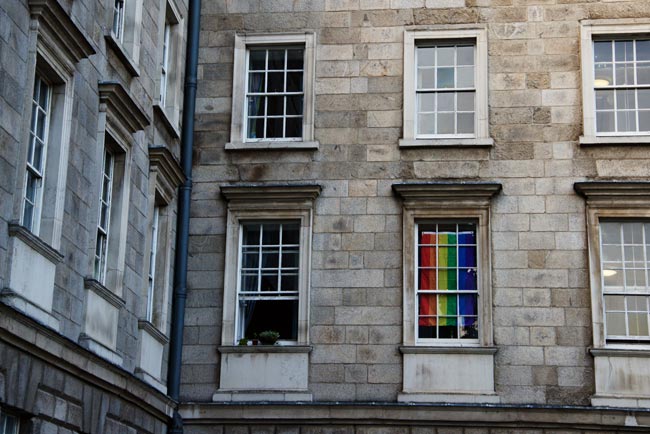Former President Mary McAleese today launched the findings of a study commissioned by the Gay and Lesbian Equality Network (GLEN) and BeLonG To, which details the “harrowing” experience of young LGBT people, and the detrimental effect this has on their mental health.
The report, conducted by a team from Trinity College and was led by the School of Nursing’s Prof Agnes Higgins, analysed 2,200 responses to an online survey by LGBT people in Ireland, with particular focus towards younger people, and from over 1,000 responses to a nationally representative telephone survey of people aged between 18-65.
According to the report, 56 per cent of 14–18 year-old LGBT respondents said that they had self-harmed, while 70 per cent of that same group said that they had seriously considered suicide.
The report also found that young LGBT people in Ireland were also prone to much higher levels of anxiety, stress and depression than their peers. LGBT teenagers are reported to be twice as likely to self-harm, three times as likely to have attempted suicide and four times as likely to to have anxiety or depression than the wider teenage population.
Speaking to The University Times from the Union of Students Ireland (USI) Congress, Trinity College Dublin Students’ Union (TCDSU) Welfare Officer, Conor Clancy, said that the report confirms the problems revealed in Irish society during the marriage equality campaign, and during discussions around the gender recognition bill: “We are still not fully accepting as a society and each one of us has a role to play in changing this.”
The report, which comes during Trinity’s annual Rainbow Week run by TCDSU and Q Soc, concluded that while LGBT people in Ireland above the age of 25 appear to have more stable mental health, LGBT people under 25, especially teenagers, exhibit worryingly higher levels of suicidal behaviour and signs of mental disorder.
Praising the “vibrant and active LGBT society” in Trinity, Clancy highlighted the importance of initiatives such as Rainbow week and the TCDSU’s “I am” campaign as vital in supporting LGBT students: “College can be a very difficult time bringing with it the challenge of adapting to a new life, supporting oneself, exploring our identity”.
Speaking to The University Times, the Treasurer of Q Soc, Lorna Doyle, said that the issues surrounding the mental health of Trinity’s LGBT community “is something that in Q Soc that we definitely try to tackle”.
Doyle mentioned that as well as Student2Student training that Q Soc committee members take to help support its members, the society also run “coming-out discussions” so that if someone is “repressing something, they can talk about it in a safe space and then we can refer them on [to the TCDSU Welfare Office]”.
Doyle pointed to the range of events organised by Q Soc for Rainbow Week, including “a coming-out discussion and queer men and queer women safe spaces just to talk about what pressures you might come under as a queer man or a queer woman”.







